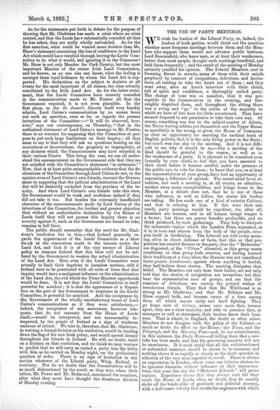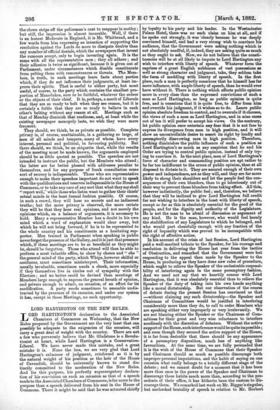THE USE OF PARTY MEETINGS.
WE wish the leaders of the Liberal Party, or, indeed, tile leaders of both parties, would think out the question whether more frequent meetings between them and the Mem- bers who support them would not advance public business. Lord Beaconsfield, who knew men, or at least their weaknesses, better than most people, thought such meetings beneficial, and held them frequently ; and the result of the meeting of Monday certainly justified his opinion. The Liberal Members met in Downing Street in crowds, many of them with their minds perplexed by rumours of resignations, defections, and hesita- tions, all tending to take the heart out of them ; and they went away, after an hour's interview with their chiefs, full of spirit and confidence, a thoroughly united party. The change of tone was so manifest, that it was per- ceptible to the Conservatives in the evening, and tho- roughly dispirited them, and throughout the sitting there was a swing and " go " in the action of the majority to which we have of late been too little accustomed. They have seemed disposed to ask permission to take their own way. Of course, something was due to the subject-matter of debate, the Tories having seldom put themselves and the Upper House so manifestly in the wrong, or given the House of Commons so clear an opportunity for asserting the cardinal truth of English politics, that it is the only living power in the State ; but much was due also to the meeting. And it is not diffi- cult to see why it should be so,—why a meeting of the kind should be grateful to the reason, as well as to the weaknesses of a party. It is pleasant to be consulted even formally by your chiefs, to feel that you have assented to their views before it became needful, under the pressure of the public eye, to vote for them ; to know that you, or at least the representatives of your group, have had an opportunity of expressing a difference of opinion. The carnal mind loves at- tention, and such a meeting is, at all events, an attention, soothes away many susceptibilities, and brings home to the Member, as a debate does not, that he is one of those who influence, as well as follow, the course his leaders are taking. He has made one of a kind of exterior Cabinet, and that is solacing to him. If this were their sole result, party meetings would be expedient, for, after all, Members are human, and in all human beings temper is a factor ; but there are graver benefits producible, and we think produced, by such gatherings. They help to dissipate the miasmatic vapour which the London Press, separated, as it is, in tone and objects from the body of the people, occu- pies itself in thickening. The Liberals are told every morn- ing, often in direct defiance of facts, that this or that pro- position has created fissures in the party, that the " Moderates" are disgusted, or the " Ultras " alienated, or this group wants conditions, or that group feels reserves, and having learned their traditions at a time when the Premier was not considered hostis generis Londinensis, against whom anything is lawful, they half-believe these stories. The meeting dissipates that belief. The Members not only hear their leader, are not only told that the stories of resignation are inventions, but they hear the representative men of groups, and see that the rumours of defections are merely the printed wishes of treacherous friends. They find that Mr. Whitbread is as strong as Mr. Gladstone, and that Mr. Dillwyn and Mr. Shaw support both, and become aware of a tone among them all which means unity and hard fighting. They go home sure of victory, aware once more that, treason apart, they are a clear majority, and able to perceive that, as managers as well as statesmen, their leaders know their busi- ness. That is where, in England, the doubt so often arises. Members do not disagree with the policy of the Cabinet, so much as doubt its effect on the House ; the Times, and the Telegraph, and the Morning Post—and, to our astonishment, in this instance, the Daily News—all telling them that a mis- take has been made, and that the governing majority will not be unanimous. It is most useful that all this evil-intentioned or unfounded nonsense should be shown to be nonsense, and nothing shows it so rapidly or clearly as the short speeches in adhesion of the very men expected to revolt. There is always an expectation in London, where every one believes electors to be ignorant dummies without influence on their representa- tives, that some fine day the "Moderate Liberals" will prove traitors. Experience shows that they always wait till they reach the House of Lords, when, no doubt, they do usually shake off the bonds alike of gratitude and political decency, with a half-comic celerity that recalls the eagerness with which
the clown strips off the policeman's coat to reappear in motley; but still, the impression is almost incurable. Well, if there is an honest Moderate in England, it is Mr. Whitbread, and a few words from him expressing an intention of supporting the resolution against the Lords do more to dissipate doubts than any number of official denials, which the newspapers that invent the rumours accept, only to begin inventing again. It is the same with all the representative men ; they all adhere ; and their adhesion is twice as significant, because it is given out of Parliament, under circumstances which disable constituents from pelting them with remonstrances or threats. The Mem- bers, in truth, in such meetings learn facts about parties which, if they do not influence their judgments, at least im- prove their spirits. That is useful to either party, but most useful, of course, to the party which contains the smallest pro- portion of Mamelukes, sure to be faithful, whatever the orders or the objects of their chief. It is, perhaps, a merit of Liberals that they are so ready to bolt when they see reason, but it is certainly a foible that they are so ready to believe in each other's bolting without any reason at all. Meetings such as that of Monday diminish that readiness, and, at least while the existing newspaper monopoly lasts, we wish they were more frequent.
They should, we think, be as private as possible. Complete privacy is, of course, unattainable, in a gathering so large, of men of all minds and tempers, many of whom have every interest, personal and political, in favouring publicity. But there should, we think, be an etiquette that, while the results of the meeting must be made known, the arguments employed should be as little quoted as possible. The speeches are not intended to instruct the public, but the Members who attend ; the latter are far better pleased with addresses peculiar to themselves, and for any purpose of frank consultation some sort of secrecy is indispensable. Those who are representative enough to make their speeches important do not want to speak with the qualifications and reserves indispensable in the House of Commons, or to take any care of any sort that what they say shall report well," while those who listen want to gather their chiefs' actual minds in the least formal fashion possible. Of course, in such a crowd, they will hear no secrets and no indiscreet truths ; but the more privacy is observed, the more certain they will be that they hear real opinions, and not merely the opinions which, on a balance of arguments, it is necessary to hold. Many a representative Member has a doubt in his own mind which a word of explanation would clear away, but which he will not bring forward, if he is to be represented to the whole country and his constituents as a hesitating sup- porter. Men trained in Parliament when speaking in public never forget the presence of the Gallery, and it is just that presence which, if these meetings are to be as beneficial as they might be, should be forgotten. Those who attend will then be able to perform a most valuable office, to show by cheers and " ohs " the general mind of the party, which Whips, however skilful or assiduous, must sometimes misinterpret. Their information, usually invaluable, sometimes needs a check, more especially if they themselves live in circles out of sympathy with the Electors ; and no better could be devised than meetings of Members large enough to express the general breath of opinion, and private enough to admit, on occasion, of an effort for its modification. A party needs sometimes to assemble undis- tracted by the presence of its enemies, and under our system it has, except in these Meetings, no such opportunity.



































 Previous page
Previous page